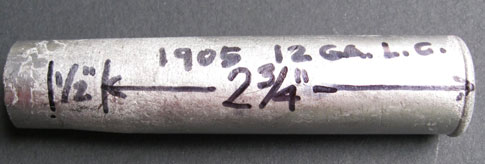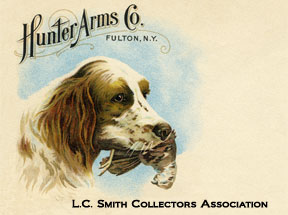|
Before this decision should be made, several issues should be considered:
- If your gun is of genuine “collector quality,” any alteration from factory original may substantially reduce its
value.
- It is possible that the wall thickness immediately past
the chamber is inadequate for lengthening the chamber. Many of
the barrels of the older shotguns have been honed out to eliminate
pitting, and, hence, the barrel walls may be thin. The entire
shotgun must be thoroughly inspected. These are good reasons
to be sure a gunsmith with expertise on classic American double
barrel shotguns does the work.
- Using 2-3/4 inch shells in short chambers has been shown
to only “slightly” raise the chamber
pressure. Sherman
Bell, in article titled "Finding Out for Myself" Part
V "Long Shells in Short Chambers" (Double
Gun Journal, Winter 2001) said that with loads that are sensible in a light
2 1/2 inch gun, he saw no dangerous pressure levels produced.
He said there was no reason, related to safety, to lengthen an original 2-1/2 inch chambered
gun to shoot 2 3/4 shells, as long as the pressure of the 2-3/4 inch load you use
is the same as the pressure of a 2-1/2 inch load.
- However, recoil may be significantly increased, especially in a 20 gauge 2-1/2 inch
chamber if the case mouth extends into the forcing cone, or even worse, the bore. Remember
that the stocks of L.C. Smith shotguns are somewhat delicate, and a cracked stock may
result from more recoil.
- Longer chambers tend to lead to the use of heavier/hotter
loads. This increases recoil which cracks stocks, and increases pressure which
stresses the action. Neither are good things in older guns.
- Lots of high quality commercial 2-1/2 inch and 67 mm loads
are available today, but usually are more expensive than even
the 3 inch magnum shells.
Bottom Line: In light of the somewhat delicate stocks on Smith
guns, anything that might lessen recoil (lengthening the
chamber and forcing cones combined with using shells with light loads and lower velocity)
is probably a good idea.
Fortunately, chamber length is not a problem with Hunter Arms
Co. or L.C. Smith Gun Co. 12 gauge guns, all of which had 2-3/4
inch chambers or were marked as having 3 inch chambers.

12 gauge cerrosafe chamber and forcing cone casting, courtesy of Marcus Merritt
COPYRIGHT
L.C. Smith Collectors
Association 2015
Updated 02/18/2015
|

